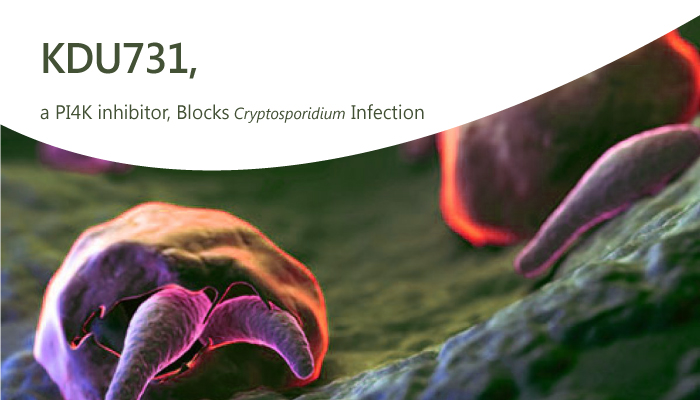The apicomplexan parasite Cryptosporidium is one of the leading causes of infectious diarrhea in children. Cryptosporidiosis is also a well-recognized opportunistic infection in adult AIDS and transplant patients. The Cryptosporidium lipid kinase PI4K as a target for pyrazolopyridines and warrant further preclinical evaluation of KDU731 as a drug candidate for the treatment of cryptosporidiosis. In particular, PI4K is a key Plasmodium vulnerability with an ideal activity profile for the prevention, treatment, and elimination of malaria.
Oral treatment with KDU731 results in a potent reduction in intestinal infection of immunocompromised mice. Treatment also leads to rapid resolution of diarrhea and dehydration in neonatal calves. Especially, KDU731 is a potent inhibitor of CpPI4K enzymatic activity with an IC50 value of 25 nM. KDU731 has a 50 fold selectivity window against the human PI4K IIIβ homolog.

Researchers examine KDU731 pharmacokinetics, metabolism, and distribution in mice, rats and rhesus monkeys. Upon intravenous administration, KDU731 displays a low to moderate volume of distribution, a low total systemic clearance. KDU731 orally-administered in suspension formulation displays a moderate half-life (T1/2 = 2-4 h) in all three species. KDU731 shows moderate-to-low oral bioavailability (37% in rodents, 9% in non-human primates). Importantly, KDU731 dramatically reduces oocyst shedding regardless of the assay method. In a modified design, KDU731 (10 mg/kg) treatment was initiated at the peak of infection again resulting in a significant reduction of oocyst shedding.
All in all, KDU731 displays good anti-cryptosporidial activity and meets a broad range of safety and pharmacology criteria required for a much needed novel cryptosporidiosis therapeutic intervention. KDU731 is a promising anti-cryptosporidial drug candidate active against both C. parvum and C. hominis .